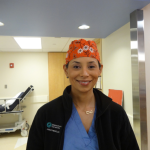As soon as Michael Potter was born, his mother, Katie, noticed that his breathing sounded strange.
It was “junky, raspy breathing,” she said. The medical team diagnosed him with tracheomalacia, a condition caused by not-fully-developed cartilage in the trachea, or windpipe, leading to a floppy trachea and trouble breathing. The doctors were reassuring, saying Michael would outgrow the condition.
The following weeks did not bring much improvement. “His breathing got louder and louder,” Katie said. “Every time he took a breath in, his nostrils would flare, his chest would cave in and his neck would tug in where his collarbone is.” Michael’s pediatrician recommended more specialized care at Massachusetts Eye and Ear: “He said that Michael really needed to be seen by a specialist,” Katie said. “And if it were his child, he would want him to see Dr. Hartnick.”
At Michael’s appointment, Christopher Hartnick, M.D., M.S. performed some tests and discovered that, in addition to tracheomalacia, Michael had laryngomalacia, a condition that leads to airway obstruction when someone inhales, and subglottic stenosis —a narrowed airway.
Over the next week and a half, Michael stayed in the pediatric intensive care unit (PICU), and Dr. Hartnick performed two supraglottoplasties, surgical procedures to open Michael’s airway.
A tracheostomy — creating an opening to the trachea through the neck in order to allow the patient to take in more air — was also suggested, but Katie and her fiancé were initially uncomfortable with the idea.
“There’s not a whole lot of mainstream information about tracheostomy tubes,” she said, “and I thought the only kids who had ‘trachs’ were severely ill children. And Michael just looked so healthy.”
After the procedures, Michael came home. About a week later, he “took a turn,” Katie said. He turned blue around the mouth and his breathing became loud again.
“It turned out he had been compensating for his narrow airways and just couldn’t do it anymore,” she said.
The family returned to Mass. Eye and Ear, but there was not enough room to do another procedure to try to open Michael’s airway more without risking damage to his voice box. Dr. Hartnick gave him a trach on April 1, 2015. Michael was just shy of four months old.
“It was a difficult time, but we were so lucky to have the team at Mass. Eye and Ear,” Katie said.
The Mass. Eye and Ear Team
“Everyone deserves to have a relationship with their child’s doctor like we do with Dr. Hartnick,” Katie said. “He is so communicative and empathetic.” He would explain the treatment options and give his advice while ensuring that the ultimate decision was left to the family. “He’s very calming,” Katie added. At the same time, “He never once made me feel like a hysterical parent.”
Nurses, too, gave needed emotional support and training in proper tracheostomy care.
“We’ve gotten so close with so many of the nurses,” Katie said. “We consider them a family.”
“There’s a lot that goes into trach care,” she added. “The nurses were patient and compassionate educators.”
“He was like a different baby”
After the procedure, “Michael was smiling; he was engaging; he was interactive,” Katie said. Before, “We would get a smile here or there, but he was just working so hard to breathe all the time.”
“After he got the trach, he was like a different baby.”
The trach allowed Michael to thrive and hit all of his milestones, Katie said. “It gave him life, really.”
Just over a year later, Michael’s airway had developed enough for Dr. Hartnick to perform a third supraglottoplasty and open Michael’s airway so he could breathe without the trach. On May 24, it was removed.
Michael is doing well. His Mass. Eye and Ear appointments may decrease, but his family’s relationship with the hospital will continue, Katie said. The family supports Mass. Eye and Ear’s Operation Airway, an organization that helps children around the world who have tracheostomies. Dr. Hartnick also gives his time to Operation Airway.
“No child deserves not to be able to breathe, and no parent should have to watch their child struggle to breathe,” Katie said. “Everybody should have access to the same kind of care and support that we do.”




Dr. Hartnick save my son as well. We love him and his team dearly!!